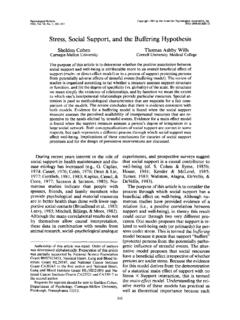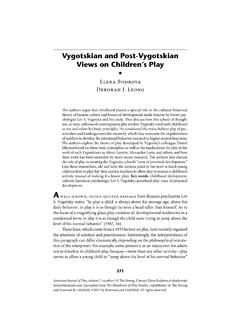Transcription of Vygotsky`s Social Constructionist View on Disability: A ...
1 1 Vygotsky`s Social Constructionist View on Disability: A Methodology for Inclusive Education Author: Katarina A. Rodina, PhD-Research Fellow, MSc. Speech and Language Pathology, Department of Special Needs Education, University of Oslo, P. O. Box 1140 Blindern, NO-0318 Oslo, Norway. E-mail: Phone: +47 22 85 81 38 Fax: + 47 22 85 80 21 2 A short summary This article analyses Vygotsky`s Social Constructionist view on disability and its practical implementation in contemporary inclusive education. The article focuses on the main concepts in Vygotsky`s theory on dysontogenesis (presented as a Social Constructionist view on disability), constituting the cultural-historical psychological basis for the Russian model in the contemporary inclusive preschool education.
2 In this article a short presentation of methodological basis of special education in Russia will be given. The aim with the article is to cover following questions: 1) What is the core of the Social Constructionist understanding of learning and development in dysontogenesis? 2) How can we achieve an appropriate understanding of handicaps as a socio-cultural developmental phenomenon in accordance with Vygotsky`s Social Constructionist views on disability? 3) How may Vygotsky`s theory on dysontogenesis be implemented in contemporary inclusive classrooms?
3 Keywords: Social constructionisme, Vygotsky, children with disabilities, inclusive education, Russia 3 Introduction The Russian educational psychologist and semioticist Lev Vygotsky (1896-1934) is first and foremost known in the West through his theories on the Social origins of higher mental functions and semiotics. Vygotsky`s contribution to the methodology of psychological sciences as well as to psycholinguistic, developmental and cognitive psychology is well known in the United States as well as in Western Europe.
4 Vygotsky`s theories on methodology in special education and psychology have, however, remained relatively unknown outside Russia to this day. In his later works (1924-1934), first published in English in 1993 as The Fundamentals of Defectology , Vygotsky developed a methodological framework for special education and psychology, with relevance for contemporary practical work with inclusive education. In Russia, Vygotsky s works in the field of special education and psychology have been crucial for the establishment of methodology in special educational practice.
5 In international research literature, Vygotsky`s view on disability, his theoretical and methodological concepts regarding special education, have largely escaped attention. In this article, a short presentation of the methodological foundations for inclusive education will be given, analyzing several of Vygotsky`s concepts, mainly presented in his work on The Fundamentals of Defectology . Based on the theory of dysontogenesis1 as well as his general theory of child development - generally known in the West as the Cultural-Historical Activity Theory, CHAT, (Stetsenko 2005) - Vygotsky formulated a practice-oriented paradigm of education for children with special needs.
6 Vygotsky`s Social Constructionist epistemology constitutes a basis in developing a unique vision for future models of special education, of an inclusion based on positive differentiation (Gindis 2003). According to Vygotsky`s theory on dysontogenesis (TD), a positive resource oriented 1 Dysontogenesis (gr. dys anomaly, ontos being, genesis development) deficient development compared to normal individual development 4 approach implies a favourable societal view on children with disabilities, giving preference to strengthening and empowerment of individual skills rather than the traditional stress on weaknesses or deviations.
7 This article will mainly focus on the vygotskian socio- Constructionist view on disability, Vygotsky s theory on dysontogenesis and its practical implementation in inclusive education. The article may also be helpful for a practical understanding of Vygotsky`s Social Constructionist view on disability qua methodology in inclusive education. The methodology applied in this investigation is based on qualitative, theoretical-historical research; more precisely document analysis. The documents include both primary and secondary sources, including Vygotsky`s original (1924 -1934) works and works of the so-called neo-vygotskians.
8 The article presents an interpretation of Vygotsky`s TD in a narrative form, using a narrative approach to the methodological basis for inclusive education in Russia. This investigation will focus on certain Grand Tour Questions (Creswell 1994, 14-15), such as the core of Vygotsky`s Theory of Disontogenesis. The main sub questions (Milles & Huberman 1984) will be as follows: 1) What is the core of Social Constructionist understanding of learning and development in dysontogenesis? 2) How to achieve an appropriate understanding of learning and developmental phenomena, based on Vygotsky`s Social Constructionist views on disability?
9 3) How may Vygotsky`s theory on dysontogenesis be implemented in contemporary inclusive classrooms? 5 Limitation The relativism of my research position implies that all we can have are the various points of view of actual persons reflecting various interests and purposes that their descriptions and theories sub serve (Smith & Deemer 2000:879). In my study, I do not claim to having achieved an absolute knowledge of Vygotsky`s theory on dysontogenesis. According to Githa Vygodskaya,2 a great number of Vygotsky`s works in the family-archives has not yet been published (not even in Russia).
10 The qualitative methodology in this study has been based on Verstehen as [an] epistemological principle (Flick 2006). My intention here has been to present my own vision of Vygotsky`s theory on dysontogenesis, a vision informed by 15 years of academic and clinical studies in the Russian cultural-historical psychological tradition, working as a speech therapist, neuro-psychologist and teacher. The main limitations in my study, are revealed in the physical inability to include all relevant sources. This investigation should be regarded as a narrative of my experience as researcher.




